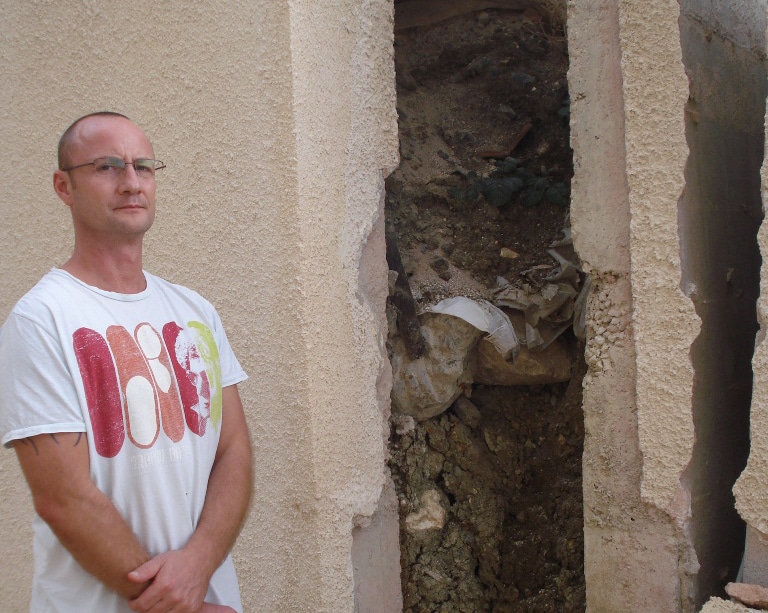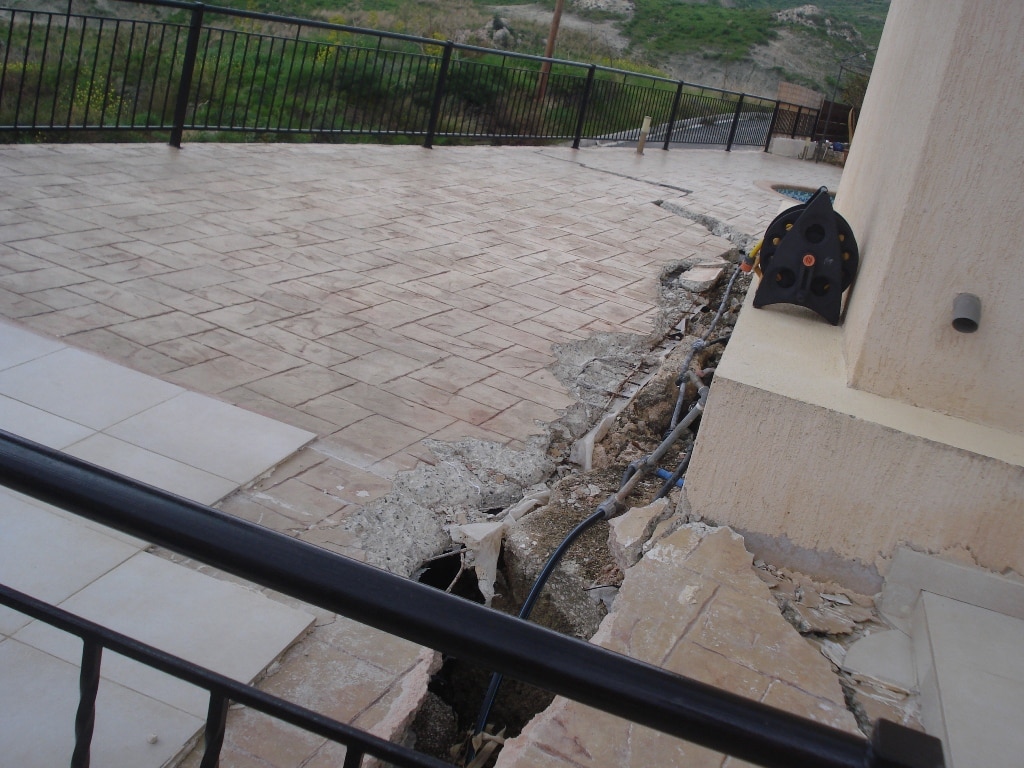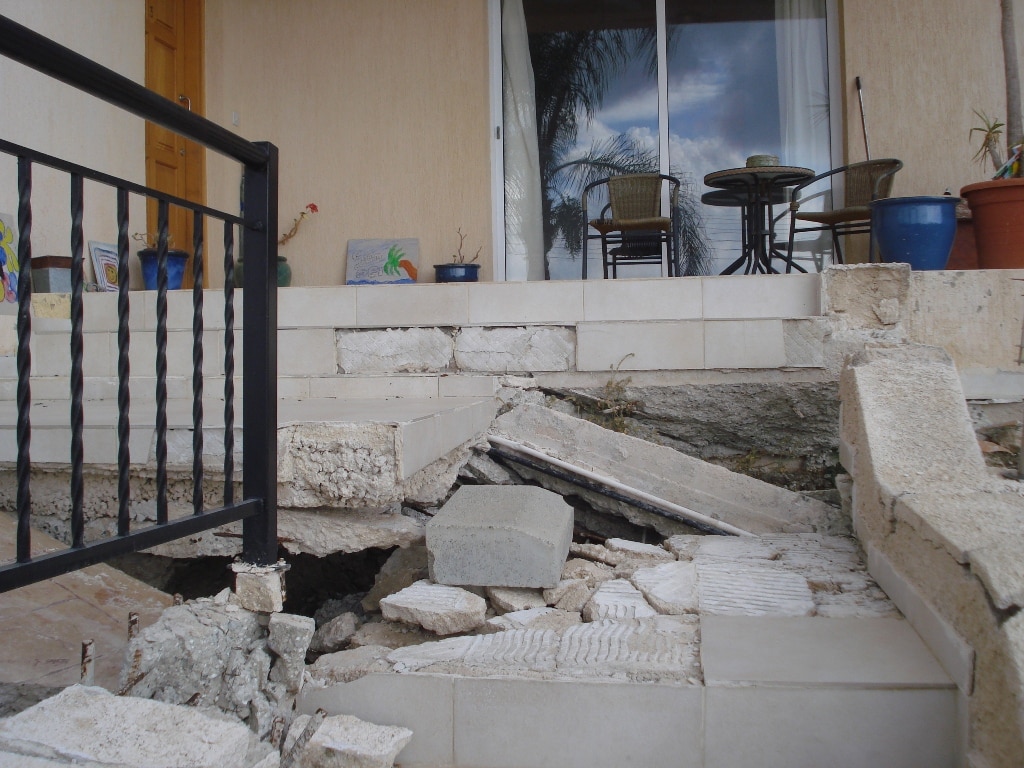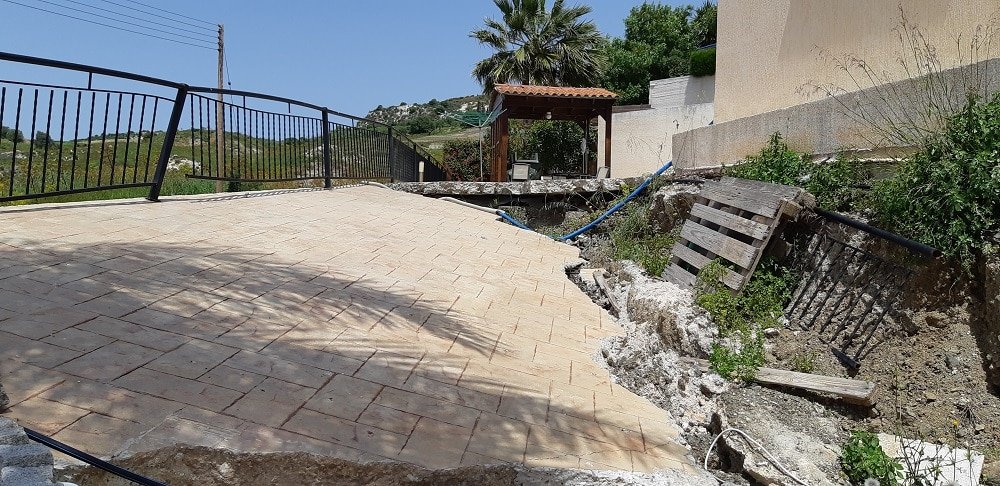After long legal battle authorities told to pay for near-collapse of house in Paphos district
A landmark decision from the Paphos district court has for the first time seen authorities ordered to compensate a British homeowner for their failure to control and supervise building regulations that led to the near-collapse of the house he and his wife bought as part of the troubled Armou development.
According to Savvas Savvides, the lawyer for the British couple, Simon and Jen Phillips, the ruling, which comes after nine years in the judicial system, could set a precedent for other problematic property developments such as in Pissouri where buyers have seen their homes collapse around them. Authorities do however have six weeks to appeal the unprecedented court decision.
“It could help other distressed homeowners, in such places as Limnes and Pissouri, if similar facts with the case in Armou match,” Savvides, a lawyer with the firm Michael Kyprianou & Co, told the Cyprus Mail.
“What I mean by this, it is a case where we would have to examine whether indeed a geological study and investigation should have been conducted, prior to issuing the building permit. You can appreciate however, that I am unable to comment on different cases or situations without having all the facts in my possession, in order to make the comparison,” he cautioned.
The ‘luxury’ development in Armou, Paphos was built by, now-defunct, JNM developers. Problems first arose in 2011 after heavy rains led to subsidence that caused the near-collapse of the homes there. Phillips, who lived in Armou with his wife Jen and their two children from 2008 when they bought the house, were by 2019, the only remaining residents of the development, trapped in a home which had a ban order on it for the previous eight years.
The house next to Phillips was tilting at such an angle, it moved down the hill by at least 12 metres.
The family had to climb broken steps and carefully step from one broken chunk of concrete and tiles to the next while there was a huge hollow in the ground. Around three metres of the concrete piles under the house were exposed, the septic tank also lay exposed, and the next door garden walls had split apart with a huge two-metre gap between.
The family had no choice but to remain living in an extremely dangerous situation as all of their cash was tied up in the property. They had bought the house for €250,000 in 2008 and moved to Cyprus. Due to financial considerations, they were unable to move out when the trouble hit, though other residents had abandoned their homes there.
The Phillips family finally took legal action in 2014. “It has been a long nine years for the case to be finalised, with a lot of problems arising through the years,” Savvides said.
“One major problem we had to face was the fact that the developing company was bankrupt at some stage, so we needed to make amendments on the pleadings, in order to progress the case towards and against the Republic.”
Ultimately, the Paphos court, in its recent ruling awarded compensation to the plaintiffs for the purchase amount of the house, plus another €5,000 in interest from the date of filing the case, and also their court costs.
The bottom line was that the judge, in a multi-page decision, clarified the responsibility of the state and its officials in terms of their duty of care in exercising their supervisory roles.
“It is a ground-breaking decision and landmark case,” Savvides said but clarified that it needs to be taken into consideration that it is a judgement of the district court and the Republic has the right to appeal. It will then be up to the court of appeal to issue a final decision.
“But on the grounds of this judgement, the principles and the reasonings behind this judgement stands, at the moment, as a landmark,” he added.
According to Savvides, the first precedent that this judgement sets and what distinguishes it from other cases, is the duty of care of the public authorities, at the time of exercising their supervisory role on examining building permits, was to exercise that duty by investigating all the factors involved, not only related with the construction itself, as provided by the architectural plans submitted by the civil engineer, but also a full and proper geological investigation needed to be conducted to check factors such as the stability of the ground.
Then, based on the geological studies of the investigation, the necessary conditions needed to be imposed on the building permit, for the construction company to take such precaution and comply with those conditions in order for the structure to be safe.
In principle, Savvides said, in the case of the British couple who bought the property, it is stipulated through the judgement that no conditions were imposed. As a result, the construction company had built a property on problematic ground under the same conditions that would be required to build a property in another area that is was not problematic. In other words, due diligence was not applied and the permits were issued as a matter of routine without distinction when it came to the land being built on.
“The judge makes it clear through his judgement, that the state bears responsibility, since it is the duty of high-ranking officers to exercise a supervisory role,” Savvides said.
“It is not only a matter of the public authorities to simply examine what they have been given to be examined, but to go beyond, and propose amendments and/or impose conditions, always taking into consideration the facts of each case. Through this judgement we have seen that despite the geological issues, which were known to the authorities, the case was examined as a normal case, without going into a deep investigation based on the area on which this property was constructed.”
The lawyer also said the judgement has basically brought up the most important aspects based on article 172 of the Constitution, where the Republic of Cyprus “shall be liable for any wrongful act or omission causing damage committed in the exercise or purported exercise of the duties of officers or authorities of the Republic”.
In this instance, responsibility was put on the town planning department and the Paphos district administration.
“The judgement in general, highlights the responsibility of the public authorities in ensuring safety and upholding their obligation. I will also dare to say, that through this judgement, it demonstrates the need to improve the system, to strengthen the controls and supervision techniques, in the field of building activity and town planning permits,” he said.
The court concluded that both the department of town planning and housing and the Paphos district administration demonstrated negligence towards the plaintiffs as owners and potential owners of the house in question. Both public agencies “breached duties arising from the relevant legislation governing their duties, to the detriment of the plaintiffs”.
As far as setting a precedent for residents in problematic developments in such places as Pissouri, the authorities are not likely to take the district court decision lying down considering what a final bill could look like for the state.
In April 2019, auditor-general Odysseas Michaelides used the example of Armou as one of the reasons why the government should not compensate the Pissouri property owners when that was a big issue. He warned that if the Pissouri owners won compensation, it would set a precedent for property owners in areas like Armou if the state essentially assumed the responsibility of the adequacy of structural studies.
Homeowner Phillips, who did not wish to comment on the recent ruling at this time, told the Cyprus Mail in 2019 that setting a precedent was actually the point. “Something needs to be done. Action needs to be taken and put in place to ensure that permits are not given to build on land that is so obviously problematic,” he said.
His house, he said, should never have been built as the area was not suitable for building, and that it was common knowledge that the hillside was historically known for land slips.
“The authorities gave a permit and changed the use from agricultural and this is negligent by the government.”
The content of this article is valid as at the date of its first publication. It is intended to provide a general guide to the subject matter and does not constitute legal advice. We recommend that you seek professional advice on your specific matter before acting on any information provided. For further information or advice, please contact Savvas Savvides, managing partner, Michael Kyprianou & Co LLC, on Tel +357 26930800 at [email protected]










Click here to change your cookie preferences